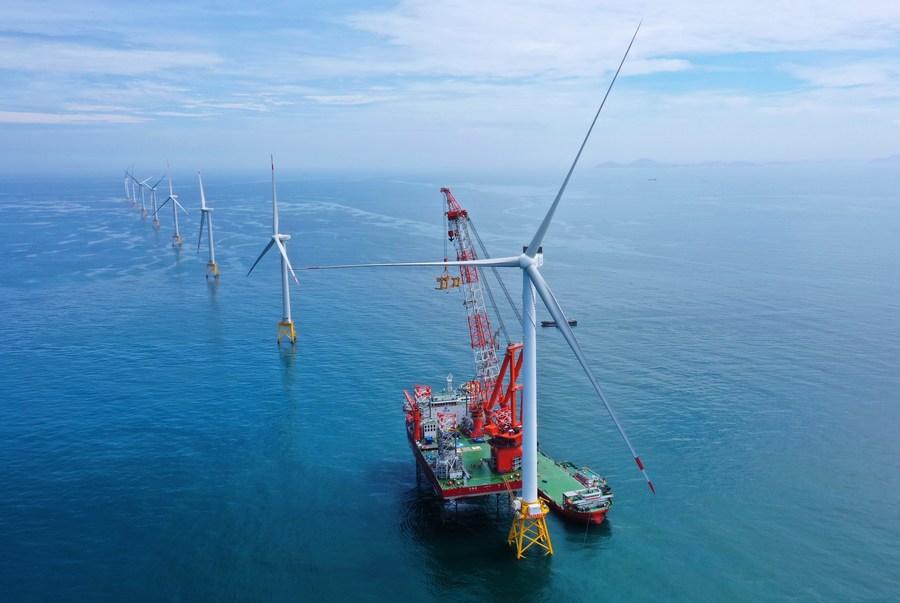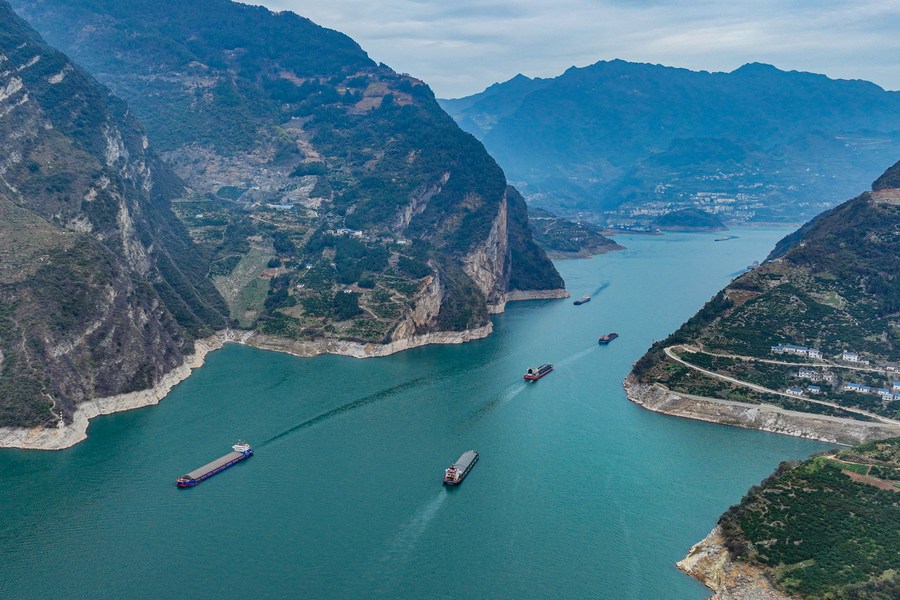Interview: China's progress in environmental protection remarkable, says expert

This aerial photo taken on June 28, 2023 shows a 16-megawatt wind turbine installed at the Fujian offshore wind farm operated by the China Three Gorges Corporation off the coast of southeast China's Fujian Province. (Xinhua/Lin Shanchuan)
China is committed to preserving the environment by promoting green development and maintaining harmony with nature, said a Rwandan environmental conservation expert.
"As an active practitioner in implementing the (United Nations') 2030 Agenda for Sustainable Development, China has made significant progress in meeting sustainable development goals," Greg Bakunzi said.
KIGALI, July 22 (Xinhua) -- China's progress in ecological construction and environmental protection is remarkable, and its policies hold primary importance not only for China but also for the world, Greg Bakunzi, a Rwandan environmental conservation expert, told Xinhua in a recent interview.
"The beginning of the 21st century marked a critical period for China's efforts to sustain rapid economic development, intensify environmental protection, and curb ecological degradation," said Bakunzi, founder of Red Rocks Initiatives For Sustainable Development.
As the largest developing country, China has taken significant steps to transition toward renewable energy sources, such as wind and solar power, and has become the world's leading investor in renewable energy technologies.

Aerial photo taken on June 29, 2022 shows the view of Angsai Canyon in Zaduo County, Yushu Tibetan Autonomous Prefecture, northwest China's Qinghai Province. Sanjiangyuan, which means the "source of three rivers," is home to the headwaters of the Yangtze, Yellow and Lancang rivers. (Xinhua/Luo Xiaofei)
Actively promoting green transportation solutions, China has also made substantial investments in electric vehicles, Bakunzi noted.
He pointed out that one of China's most remarkable aspects of its commitment to nature is its advocacy for harmonious coexistence between humans and the environment.
As a testament to this approach, China has successfully reintroduced 112 rare and endangered plant species into the wild. Furthermore, the establishment of national parks, including the Three-River-Source National Park and the Giant Panda National Park, showcases China's dedication to preserving biodiversity for generations, said Bakunzi.
He noted that China's commitment to creating an ecological civilization is evident through large-scale national restoration programs and afforestation initiatives.

This aerial photo taken on March 29, 2023 shows the scenery of Xiling Gorge, one of the Three Gorges on the Yangtze River, in central China's Hubei Province. (Xinhua/Xiao Yijiu)
"As an active practitioner in implementing the (United Nations') 2030 Agenda for Sustainable Development, China has made significant progress in meeting sustainable development goals. It has issued a position paper that announces its national plan and has taken the lead in releasing its national progress report," Bakunzi said.
He added that efforts to meet sustainable development goals include eliminating poverty, protecting marine environments, effectively utilizing energy, tackling climate change and conserving land ecosystems.
Bakunzi said China is committed to preserving the environment by promoting green development and maintaining harmony with nature. It has announced a plan for fulfilling its "dual carbon" goal of peaking carbon dioxide emissions by 2030 and achieving carbon neutrality by 2060, is contributing to global afforestation, and has observed an improvement in the ecological environment, benefiting rare species such as pandas, ibises and elephants.

This photo taken on April 28, 2023 shows milu deer at Shishou Milu Deer National Nature Reserve in central China's Hubei Province. (Xinhua/Wu Zhizun)
Stressing that China actively promotes sustainable development through multilateralism and the concept of a community with a shared future for mankind, Bakunzi said it has strengthened international cooperation in climate change, marine pollution governance and biodiversity conservation.
The country has promoted the Belt and Road Initiative (BRI) and supports bolstering clean energy in BRI participating countries, he said, adding that China has pursued South-South cooperation to help developing countries improve their environmental governance capabilities and enhance livelihoods and well-being.
Through these initiatives, China aims to foster mutual understanding, promote knowledge exchanges and support sustainable development goals worldwide, he added.


